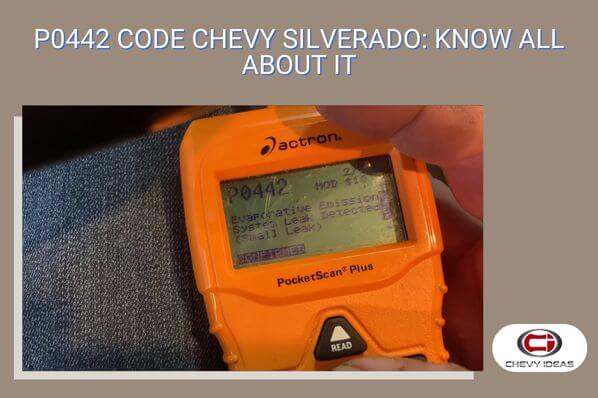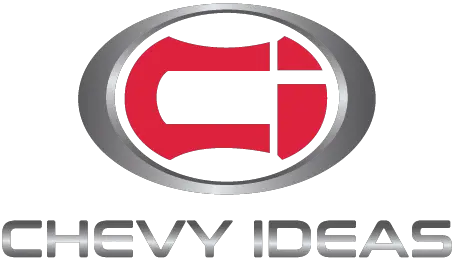Most of the time, when a vehicle such as a Chevy Silverado has problems, and you get it checked, they’ll give you a DTC code, sometimes even several codes. All of these codes refer to a different issue with your vehicle.
So what does it mean to have a P0442 code Chevy Silverado? In short, it refers to having a leak in the evaporative emission control system, or the EVAP system for short. This means you’ll be using more fuel than you have to, which can end up costing a lot of money.
There’s much more to it than just that. Today, I’ll be going over the P0442 DTC code, what it means, its causes, fixes, and more. With that all said, let’s get straight into it.
P0442 Code Chevy Silverado
When there’s a small leak in your EVAP system, the code P0442 can get triggered. The evaporative emission control system prevents all sorts of vapors, especially from the fuel escaping into the atmosphere.
Here’s a table with all the reasons and fixes to the code P0442 on a Chevy Silverado. I’ll go over these in better detail later on.

| Reason | Fix |
| Damaged or loose gas cap | Tighten the cap or replace it |
| Disconnected or leaking EVAP hose | Check your hose for leaks, and fix them or replace them |
| Faulty fuel tank or charcoal canister | Replace the fuel tank or charcoal canister entirely. |
| Faulty canister vent control valve | Inspect the canister control valve and replace it if necessary |
How To Fix P0442 Code On Chevy Silverado?
P0442 is a relatively common DTC code with Chevy Silverados. Each code is different, and there’s a different way to fix it. So the P0172 and P0175 Chevy Silverado codes will be different from P0442.
Fixing them is relatively complicated, especially if you’re doing it yourself. Before I begin, make sure you don’t have any other codes with your vehicle.
Especially if you have codes like P0441 or P0440, which are also codes concerning leaks relating to the EVAP system and the parts around it, you should fix them before treating P0442.
If you’re ready to do it yourself, here’s a detailed explanation on how to fix the code P0442–
Damaged Or Loose Gas Cap
Having a loose or damaged gas cap is one of the most common causes of having the DTC code P0442, as it directly influences the fuel leak by simply leaking out of the gas cap before even reaching the EVAP system.
Solution
The solution to this issue is the simplest, as you usually just need to tighten the cap. If that doesn’t work, your cap itself most likely has a crack inside the cap itself or is damaged.
When this is the case, you should simply replace the gas cap. It usually won’t cost much, and you can get one from a local vehicle repair store or online from online. You can check the price right now here.
Leaking EVAP Hose
If you have a leaking EVAP hose or if it has any small cracks in the hose, you can get the DTC code
Solution
The EVAP hose is usually located near the engine air box, so find them first. After that, check for any disconnected or damaged hoses. Repair the hose if it’s damaged, and make sure it’s connected properly.
Faulty Fuel Tank Or Charcoal Canister
The fuel tank and charcoal canister are important parts for your Chevy Silverado to run properly and get the right fuel. If these have problems, you might get the DTC code P0442.
Solution
To fix this, simply check for any leaks or damage in these parts. If you find any damage, you should replace the parts. But if the damage is minor, you can get it fixed by a technician. A faulty fuel tank is much more common and relatively cheap as well, and you can easily find one on Amazon.
Faulty Charcoal Canister Vent Control Valve
When the charcoal canister vent control valve is faulty, it can have leaks or get sticky, disrupting the flow of fuel and causing problems overall.
Solution
The canister vent control valve is beneath a Chevy Silverado. To access it, just remove the hoses around it and unplug it to take it out. After that, you should make sure to blow air through one of the openings. If you see that the flow of air isn’t coming out properly, then it’s faulty. When this is the case, you should just replace it entirely.
EVAP Leaks
Overall, if you’ve done all of these above and you want to verify if you still have any leaks with your EVAP system, you should do a test first.
Solution
The easiest way to check for leaks in your EVAP is by doing a smoke test. You can get a smoke testing kit yourself, but it’s highly recommended to get it tested by a professional instead. This will verify that it’s done properly.
After doing this and fixing all the issues, you shouldn’t have the code P0442 anymore if there were no other codes before.
Frequently Asked Questions (FAQs)
Now that you have a good idea about the code P0442 and how to fix it, you should take a look at the most frequently asked questions I hear people ask. These can help clear up any further confusion —
Yes, you can drive with a P0442 code on your Chevy Silverado. However, it’s still highly recommended not to do this. Because after running your engine for a while with this DTC code, your engine may start to get serious issues. Along with that, a lot of fuel will be wasted. So overall, don’t drive for long with this code.
Normally without any leaks, it’ll cost around $117 to fill up a completely empty tank. This will last for a relatively long time, as Chevy Silverado trucks are relatively efficient with fuel usage. But with a code like P0442, where you have leaks, the fuel won’t last as long, and it can cost more.
No, the engine issues don’t easily occur if the vehicle isn’t incredibly old. You can expect superior engine performance for all Chevies, and you can check my article on Avalanche vs Silverado, where the engine problems aren’t the primary differentiator.
If you already have other DTC codes activated, including the P0442, such as P0172 or P0175, then you should fix them before fixing P0442. If you don’t do this, the codes will most likely interfere with each other, and none of the codes will go away completely even after doing all the steps.
Conclusion
Hopefully, now you have a good idea all about the P0442 code Chevy Silverado. It’s a relatively common issue regarding leaks, but it does take a bit of effort to fix.
As long as you have the gas cap, EVAP hose, charcoal canister and valve, fuel tank, and control vent canister valve working properly, you most likely won’t get this issue. Do a smoke test to test for leaks quickly. Cheers!
